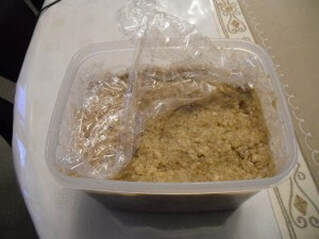When I was told this I googled “Miso paste recipe” and was surprised to find that Google was completely useless- there were plenty of recipes using miso paste but none which showed you how to make the paste itself- they all assumed that you bought it ready made from the supermarket. So I emailed my friend Makiko in Tokyo who, as it happened, was just in the process of making a batch. She kindly sent me her recipe, here it is:
Ingredients 1kg whole soybeans 3ltr water 1kg dried rice koji 400g Salt Method: Rinse the whole soybeans with water then soak them in 3litres of water overnight. The next day, boil the soaked beans with the soaking water. Remove scum. You need to boil them for about 4 hours to obtain soft soybeans. Crumble the koji, then add salt and mix them well. Mash the soft beans while they are hot (about 35-40 degrees, any higher will deactivate the koji culture), using a potato masher. Add malt with salt into the mashed beans. Shape the mixture into balls, then throw them into the container. This process prevents the mashed beans from containing air. Level the surface and sprinkle 2 teaspoons of salt over the top to prevent mould growth. Cover the surface of the mashed beans with cling film and put a weight (about 3kg) on top. The fermentation will start immediately. The container should be place in a clean room with moderate temperatures (15°C – 25°C). The miso will be ready after 6 to 12 months fermentation. During the fermentation some liquid (=tamari) will rise to the surface. If no liquid tamari is seen on the surface then the pressing weight must be increased. Each time you want to inspect the fermentation process you will lose quality, so only do it when necessary and no more than once every 2 months. This miso can be kept in the container for a few years.
0 Comments
Leave a Reply. |
|


 RSS Feed
RSS Feed